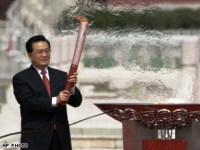 Would an Olympic boycott really inspire China to improve its human rights record and its dealings with Tibet? Or would it make things worse, asks Nick Young
Would an Olympic boycott really inspire China to improve its human rights record and its dealings with Tibet? Or would it make things worse, asks Nick Young
Tibet’s Himalayan neighbours in Bhutan and Nepal are beginning to build political institutions better fitted to the 21st century, and there is no doubt that Beijing should renegotiate its relationship with Lhasa in keeping with this zeitgeist.
But would an Olympics boycott advance this process or, indeed, advance human rights in China generally? Almost certainly not. Humiliating the government of China is, in this instance if not always, a less astute tactic than campaigners suppose, and is likely to prove counterproductive.
China expected the Olympics to signal the end of a long era of humiliation that began 170 years ago with the Opium Wars. By 2000 it seemed that China had at last emerged from the shadows of western bullying, Japanese invasion, civil war, internecine political struggle and failed development. The political elite saw hosting the Olympics as a celebration of this renaissance. They will take efforts to spoil the Games as a sign that, rather than being ready to accommodate China’s peaceful rise, the west is determined to slap China back down the development ladder.
This would not dent only Communist Party hubris, for the currents of Chinese patriotism run deep and wide, touching even those who are no friends of the political establishment. Take Hu Jia, for example, the ‘AIDS activist’ recently jailed for three years on subversion charges, as reported by countless western media. Hu, a professing Buddhist, has declared his sympathy for the plight of Tibetans. But less well known in the west is the fact that he was also active in a group that asserts Chinese sovereignty over the Diaoyutai (Pinnacle) Islands, and participated in the wave of anti-Japanese protests that swept across China in 2004.
Less equivocal patriotism is visible on dozens of websites that vent the feelings of tens of thousands of Chinese studying overseas. These are not mindless drones mobilized by the Communist Party. They are well-educated, independent-minded people who frequently deplore the problems in their own political system and who have experienced the west’s democratic institutions and free press at first hand. Overwhelmingly, they express outrage at the way that western media promptly portrayed a violent attack on their compatriots in Lhasa last month as a repressive crackdown on peaceful protest. And it is easy to see how they conclude that white men speak with forked tongues: one has only to think of the fate of indigenous peoples across the Americas and in Australia.
Olympic tensions thus bring Sino-Occident relations, rather than Tibet, centre-stage. The likeliest outcome of a boycott would be a surge of nationalist sentiment in China, sweeping along a younger generation who grew up in the post-Mao era and are more cosmopolitan than their parents but who might easily be persuaded that, yes, the Party was right, foreigners really do hate us.
A boycott would very likely propel Beijing into a closer relationship with Moscow and possibly signal the start of a new Cold War. This would be bad for our common security, bad for the global economy, bad for global action on climate change and bad for political reform in China. It would empower the country’s most reactionary and xenophobic forces and inclinations and roll back the — considerable, albeit zig-zagging — advances that have been made, since 1989, towards more open, consultative and responsive government.
Nor would a boycott be likely to help Tibetans. The political fundamentals are that the Communist Party rules the Han population with the tacit, if often grudging, consent of the great majority, who see no realistic alternative; but that in the ‘autonomous’ regions of Tibet and Xinjiang Beijing’s rule is widely resented. This is a major problem for the central government, which pours investment and huge, albeit inefficient, welfare subsidies into these areas, along with a variety of preferential policies for non-Han people. None of this has sufficed to win widespread allegiance among Tibetans and Uighurs.
It is thus clear that Beijing’s policies towards minority nationalities, crafted in the command-economy era, are failing. The authorities need to reach a political settlement with exiles, build more representative institutions in outlying regions and give them more real autonomy.
It is extremely hard, though, to see what process might lead to this outcome. There has been little progress over the last decade (although many educated young Chinese are beginning to take an interest in both Buddhism and Tibet), and policy is unlikely to change without pressure. It is just possible that the events to date will serve as a wake-up call to Beijing and prompt dialogue. After all, Beijing has responded to a wave of rural unrest in central provinces with a ‘new socialist countryside’ policy to improve governance and mitigate hardship.
But international boycott calls are likely to lead to a hardening of positions. And it is almost certain that an angry, embattled and overtly nationalist Beijing, convinced that the riots in Lhasa were deliberately started by separatists determined to seize the Olympic limelight, would not treat Tibet any better.
Nick Young is a journalist. He was editor of China Development Brief until last year, when the Chinese authorities closed down the English language edition





